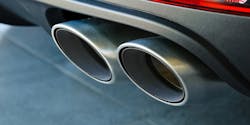California and Automakers Finalize Emission Rules after Federal Challenge
California’s regulatory board in charge of air quality announced August 17 that BMW AG, Ford Motor Co., Honda Motor Co., Volkswagen AG, and Volvo Cars had all signed onto agreements binding them to state regulatory standards. According to CARB, California’s Air Resource Board, the agreement also applies to Rolls Royce and Audi cars.
General Motors, Fiat Chrysler Automobiles NV, and Toyota Motor Corp. did not sign on to the agreements. The three companies have sided with the EPA in a lawsuit on whether or not the federal government can revoke California’s authority to set its own emission restrictions.
According to CARB, the agreements signed by the automakers “support continued annual reductions of vehicle greenhouse gas emissions through the 2026 model year,” support fleet conversion to electric vehicles, and provide certainty. CARB also notes that the agreements will result in light trucks and cars to get cleaner through 2026 “at about the same rate as the former Obama-era program.”
The move puts California regulators at odds yet again with the Environmental Protection Agency on the issue of tailpipe emissions. The current EPA favors more lax emissions regulation: in March, it finalized a rule saying that automakers must improve vehicle emissions standards by 1.5% each year until 2026, a more relaxed rule than the 5% per year rate under the Obama-era EPA. In its push to deregulate auto efficiency, the current EPA has butted heads with California, which has been allowed to set its own, stricter emissions standards since the 1970 Clean Air Act.
Complicating the issue is California’s clout in U.S. emissions regulations: 14 other states and the District of Columbia endorsed the August 17 memo. According to Reuters, the bloc of states that adopt California’s regulations on tailpipe emissions represents about 40% of the U.S. auto market.
In June 2019, after talks between federal and California state regulators on emissions regulations broke down, a group of 17 major automakers sent letters to President Donald Trump and Governor Gavin Newsom urging them to come to an understanding, lest they split the U.S. market between two different regulatory systems.
Later that year, after Honda, Ford, VW and BMW signed a voluntary agreement to abide by Californian standards, the Justice Department launched an antitrust probe into the agreement. In September, President Trump announced he would revoke the state’s waiver to regulate vehicle efficiency. Californian leaders have vowed to take the battle over their waiver to the Supreme Court if necessary.
About the Author
IW Staff
Find contact information for the IndustryWeek staff: Contact IndustryWeek
